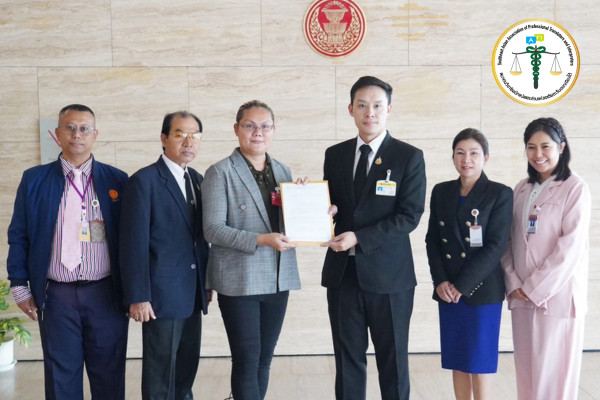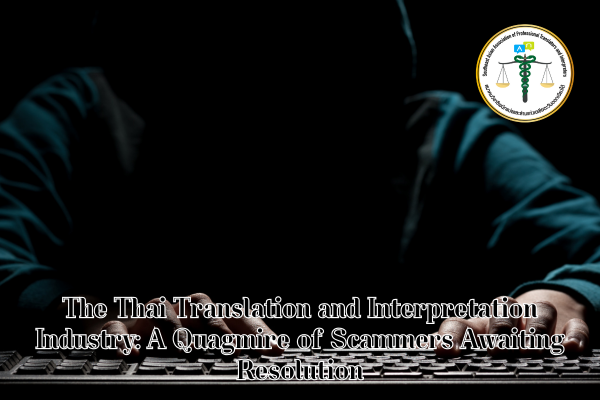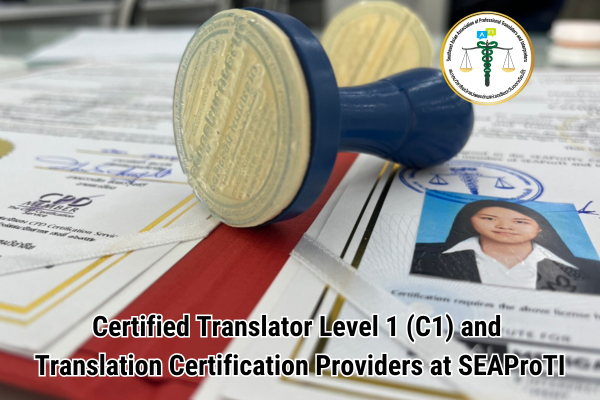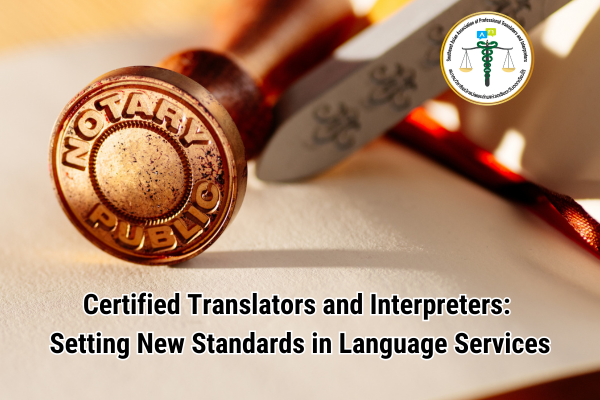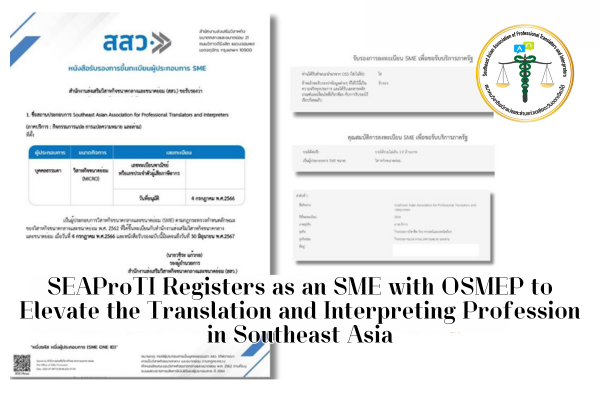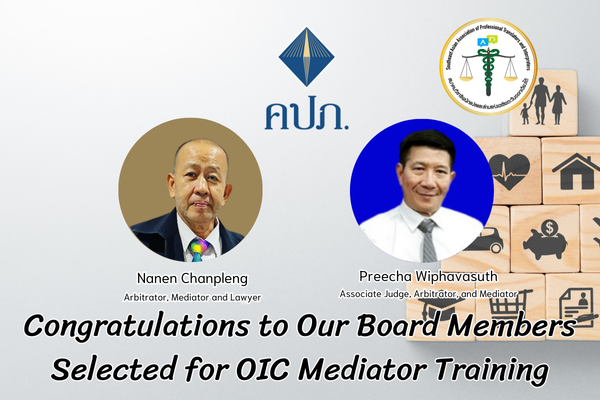Elevating the Standards of Certified Translators and Interpreters in Thailand
On September 25, 2024, at the Parliament Building, the Southeast Asian Association of Professional Translators and Interpreters (SEAProTI), led by its President, Khun Wanitcha Sumanat, submitted a draft of the Certified Translators, Translation Certification Providers, and Certified Interpreters Act to Senator Prinya Wongchoetkwan. The proposed legislation aims to establish professional standards for translators and interpreters in Thailand, enhancing their credibility and professionalism to align with international benchmarks.
The Necessity of the Certified Translators and Interpreters Act
Currently, translators and interpreters play a vital role in various sectors, including judicial processes, medical interpretation, and international business communications. However, the profession faces challenges due to inconsistent professional standards and a lack of regulatory oversight. This has resulted in gaps in service quality and consumer protection.
Khun Wanitcha Sumanat explained that the proposed Act focuses on creating qualification standards, issuing professional licenses, and improving the skills of certified translators and interpreters to meet the evolving demands of the labor market. Establishing clear standards will help prevent issues related to translation quality, which can otherwise cause significant harm to service users.
Objectives and Benefits of the Proposed Act
The proposed Act aims to achieve several key objectives:
Defining Qualification Standards
The Act sets out the criteria for certification, ensuring that practitioners possess the necessary skills and knowledge.
Issuance of Professional Licenses
Certified translators and interpreters will receive professional licenses, building trust among service users.
Quality Assurance
The regulatory body established under the Act will oversee the quality of translation and interpretation services on an ongoing basis.
Protecting Service Users
By guaranteeing high-quality translation and interpretation services, the Act will safeguard the rights of service users and ensure the accuracy of translated content.
Professional Council: A Key Regulatory Body
The draft legislation also proposes the establishment of a Professional Council for Translators and Interpreters, which will play a critical role in several areas:
Setting Professional Standards
The Council will define professional standards for certified translators and interpreters, including ethical guidelines and qualification benchmarks.
Licensing and Renewal
Practitioners will be required to pass certification exams and obtain a license from the Council. Licenses must be periodically renewed to ensure ongoing compliance with standards.
Professional Development
The Council will provide training and skill development programs, enabling practitioners to adapt to changing market needs.
Support from Public and Private Sectors
Senator Prinya Wongchoetkwan emphasized the importance of promoting the translation and interpreting profession in an era where cross-border communication plays a crucial role in economic and social development. Establishing clear professional standards and regulatory oversight will enhance public confidence and improve the capabilities of Thai translators and interpreters in the global marketplace.
From a private sector perspective, having certified and qualified translators and interpreters will mitigate the risks of miscommunication in critical contexts such as international business negotiations or legal proceedings.
The Importance of Professional Ethics
Another significant aspect of the proposed Act is the emphasis on professional ethics. Clear ethical standards will guide certified translators and interpreters in conducting their work with impartiality, integrity, and confidentiality.
Conclusion
The draft Certified Translators, Certified Translation Reviewers, and Certified Interpreters Act, submitted by SEAProTI, marks a crucial step toward establishing standards and enhancing the credibility of the translation and interpreting profession in Thailand. If approved, this legislation will elevate the profession to compete internationally and provide assurance to both domestic and international clients.
Advocating for this legislation not only paves the way for future translators and interpreters but also lays a solid foundation for a profession that plays a pivotal role in a world where seamless communication is the key to success.
About SEAProTI’s certified translators, translation certification providers, and certified interpreters:
The Southeast Asian Association of Professional Translators and Interpreters (SEAProTI) has officially announced the criteria and qualifications for individuals to register as “Certified Translators,” “Translation Certification Providers,” and “Certified Interpreters” under the association’s regulations. These guidelines are detailed in Sections 9 and 10 of the Royal Thai Government Gazette, issued by the Secretariat of the Cabinet under the Office of the Prime Minister of the Kingdom of Thailand, dated July 25, 2024, Volume 141, Part 66 Ng, Page 100.
To read the full publication, visit: the Royal Thai Government Gazette
ยกระดับมาตรฐานอาชีพนักแปลรับรองและล่ามรับรองในประเทศไทย
เมื่อวันที่ 25 กันยายน 2567 ณ อาคารรัฐสภา สมาคมวิชาชีพนักแปลและล่ามแห่งเอเชียตะวันออกเฉียงใต้ (SEAProTI) นำโดยคุณวณิชชา สุมานัส ได้ยื่นข้อเสนอ ร่างพระราชบัญญัติ (พ.ร.บ.) วิชาชีพนักแปลรับรอง ผู้รับรองการแปล และล่ามรับรอง ต่อสมาชิกวุฒิสภา นายปริญญา วงษ์เชิดขวัญ โดยมีเป้าหมายในการสร้างมาตรฐานวิชาชีพสำหรับนักแปลและล่ามในประเทศไทย เพื่อยกระดับความน่าเชื่อถือและความเป็นมืออาชีพให้ทัดเทียมกับมาตรฐานสากล
ความจำเป็นของ พ.ร.บ. วิชาชีพนักแปลรับรองฯ
ในปัจจุบัน วิชาชีพนักแปลและล่ามมีบทบาทสำคัญในหลายภาคส่วน ไม่ว่าจะเป็นการแปลในกระบวนการยุติธรรม การแปลทางการแพทย์ หรือการแปลในบริบทธุรกิจระหว่างประเทศ อย่างไรก็ตาม อาชีพนี้ยังคงประสบปัญหาเรื่องมาตรฐานวิชาชีพที่แตกต่างกัน รวมถึงการขาดการกำกับดูแลจากภาครัฐ ทำให้เกิดช่องว่างในการคุ้มครองผู้ใช้บริการ
คุณวณิชชา สุมานัส กล่าวว่า ร่าง พ.ร.บ. ฉบับนี้มุ่งเน้นการสร้างมาตรฐานคุณวุฒิและการออกใบอนุญาตวิชาชีพ รวมถึงการพัฒนาทักษะของนักแปลและล่ามให้สามารถตอบสนองความต้องการที่เปลี่ยนแปลงของตลาดแรงงาน การมีมาตรฐานที่ชัดเจนจะช่วยป้องกันปัญหาด้านคุณภาพของงานแปลและล่ามที่อาจส่งผลเสียหายต่อผู้ใช้บริการ
จุดมุ่งหมายและประโยชน์ของ ร่าง พ.ร.บ.
ร่าง พ.ร.บ. วิชาชีพนักแปลรับรองฯ นี้มีเป้าหมายเพื่อ:
กำหนดมาตรฐานคุณวุฒิ
กำหนดเกณฑ์การรับรองคุณวุฒิของนักแปลและล่าม เพื่อให้มั่นใจว่าผู้ปฏิบัติงานมีทักษะและความสามารถที่เพียงพอ
การออกใบอนุญาตวิชาชีพ
นักแปลและล่ามที่ผ่านการรับรองจะได้รับใบอนุญาตวิชาชีพ เพื่อสร้างความเชื่อมั่นให้กับผู้ใช้บริการ
การกำกับดูแลคุณภาพงาน
หน่วยงานที่จัดตั้งขึ้นตาม พ.ร.บ. จะมีบทบาทในการกำกับดูแลและพัฒนาคุณภาพงานของนักแปลและล่ามอย่างต่อเนื่อง
การคุ้มครองผู้ใช้บริการ
ร่างกฎหมายจะช่วยปกป้องสิทธิของผู้ใช้บริการ โดยการให้ความมั่นใจว่าการแปลและล่ามมีคุณภาพและความถูกต้องตามมาตรฐาน
สภาวิชาชีพ: เครื่องมือในการกำกับดูแล
ร่าง พ.ร.บ. ฉบับนี้ยังเสนอให้มีการจัดตั้ง สภาวิชาชีพนักแปลและล่าม ซึ่งจะมีหน้าที่สำคัญในหลายด้าน ได้แก่:
การกำหนดมาตรฐานวิชาชีพ
สภาวิชาชีพจะทำหน้าที่ในการกำหนดเกณฑ์มาตรฐานสำหรับนักแปลรับรองและล่ามรับรอง ทั้งในด้านคุณวุฒิและจรรยาบรรณวิชาชีพ
การออกใบอนุญาตและการต่ออายุ
ผู้ที่ต้องการประกอบอาชีพในฐานะนักแปลรับรองและล่ามรับรองจะต้องผ่านการทดสอบและได้รับใบอนุญาตจากสภาวิชาชีพ และต้องต่ออายุใบอนุญาตอย่างสม่ำเสมอ
การพัฒนาทักษะวิชาชีพ
สภาวิชาชีพจะมีบทบาทในการจัดอบรมและพัฒนาทักษะของนักแปลและล่าม เพื่อให้สามารถตอบสนองความต้องการของตลาดและการเปลี่ยนแปลงในสภาพแวดล้อมการทำงาน
การสนับสนุนจากภาครัฐและเอกชน
นายปริญญา วงษ์เชิดขวัญ สมาชิกวุฒิสภา ให้ความเห็นว่า การผลักดันวิชาชีพนักแปลและล่ามมีความสำคัญอย่างยิ่งในยุคที่การสื่อสารระหว่างประเทศมีบทบาทสำคัญต่อเศรษฐกิจและสังคม การกำหนดมาตรฐานวิชาชีพและการกำกับดูแลอย่างเป็นระบบจะช่วยเพิ่มความเชื่อมั่นให้กับผู้ใช้บริการ รวมถึงยกระดับศักยภาพของนักแปลและล่ามไทยในตลาดสากล
ในมุมมองของภาคเอกชน การมีนักแปลและล่ามที่มีคุณภาพและผ่านการรับรองจะช่วยลดความเสี่ยงในการสื่อสารผิดพลาดในบริบทที่มีความสำคัญ เช่น การเจรจาธุรกิจระหว่างประเทศ หรือการแปลในกระบวนการยุติธรรมที่อาจส่งผลกระทบต่อคดีความ
ความสำคัญของจรรยาบรรณวิชาชีพ
อีกหนึ่งประเด็นสำคัญที่ร่าง พ.ร.บ. ฉบับนี้เน้นย้ำคือ จรรยาบรรณวิชาชีพ การมีมาตรฐานจรรยาบรรณที่ชัดเจนจะช่วยให้นักแปลและล่ามสามารถปฏิบัติงานอย่างมืออาชีพ โดยยึดหลักความเป็นกลาง ความซื่อสัตย์ และการรักษาความลับของข้อมูล
บทสรุป
ร่าง พ.ร.บ. วิชาชีพนักแปลรับรองฯ ที่สมาคมวิชาชีพนักแปลและล่ามแห่งเอเชียตะวันออกเฉียงใต้ยื่นเสนอ ถือเป็นก้าวสำคัญในการพัฒนามาตรฐานและความน่าเชื่อถือของวิชาชีพนักแปลและล่ามในประเทศไทย หากร่างกฎหมายนี้ได้รับการอนุมัติ จะเป็นการยกระดับวิชาชีพนี้ให้สามารถแข่งขันในตลาดสากล และสร้างความมั่นใจให้กับผู้ใช้บริการทั้งในประเทศและต่างประเทศ
การผลักดันร่างกฎหมายนี้จึงไม่เพียงแต่เป็นการปูทางสำหรับนักแปลและล่ามในอนาคต แต่ยังเป็นการวางรากฐานที่มั่นคงสำหรับวิชาชีพที่มีบทบาทสำคัญในโลกที่การสื่อสารไร้พรมแดนเป็นหัวใจสำคัญของความสำเร็จ
เกี่ยวกับนักแปลรับรอง ผู้รับรองการแปล และล่ามรับรองของสมาคมวิชาชีพนักแปลและล่ามแห่งเอเชียตะวันออกเฉียงใต้
สมาคมวิชาชีพนักแปลและล่ามแห่งเอเชียตะวันออกเฉียงใต้ (SEAProTI) ได้ประกาศหลักเกณฑ์และคุณสมบัติผู้ที่ขึ้นทะเบียนเป็น “นักแปลรับรอง (Certified Translators) และผู้รับรองการแปล (Translation Certification Providers) และล่ามรับรอง (Certified Interpreters)” ของสมาคม หมวดที่ 9 และหมวดที่ 10 ในราชกิจจานุเบกษา ของสำนักเลขาธิการคณะรัฐมนตรี ในสำนักนายกรัฐมนตรี แห่งราชอาณาจักรไทย ลงวันที่ 25 ก.ค. 2567 เล่มที่ 141 ตอนที่ 66 ง หน้า 100 อ่านฉบับเต็มได้ที่: นักแปลรับรอง ผู้รับรองการแปล และล่ามรับรอง


